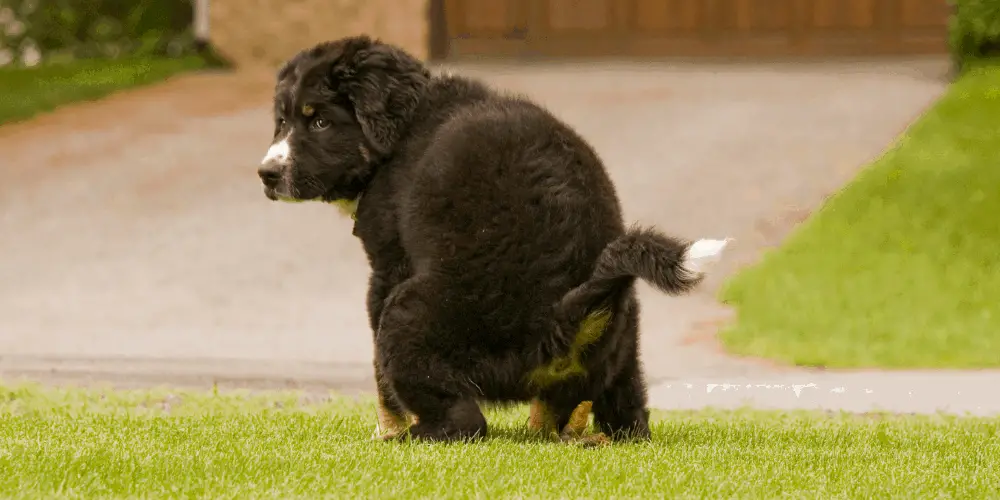It may seem like a strange question, but a lot can be told about how often a puppy poops. Mainly, you can gauge whether or not a puppy is in good digestive health by how often it relieves itself as well as its texture.
As a general rule, a puppy should poop between one and five times a day. If it’s the same frequency within these times, it’s the norm for that dog, and abnormalities can be noticed if they go more or fewer times per day.
Of course, this relies on whether or not you’re properly regulating how much the dog eats and how often it eats. Both are best done with your dog’s health in mind, with adjustments being made as your puppy progresses into adulthood.
Every breed is different in this regard. Some breeds are prone to obesity and will eat anything that’s put in front of them as often as possible, while others might take what they want from a bowl, and nip at it throughout the day.
Either way, a dog’s regular pooping habits are directly related to what they eat, how much, and how often. All of the above is important to pay attention to for the purposes of monitoring your dog’s health.
How Often Do Puppies Poop at Night?
The amount of time your puppy will need to potty at night will depend on when it ate last, and also its age. If your puppy is 2-3 months old, it’ll need to go at least twice but no more than three times throughout the night, say, from 8:00 pm to 8:00 am.
How Often Do Puppies Poop in a Day?
The number of times a puppy needs to defecate throughout the night shouldn’t be much different throughout the day. If a puppy the same age (2-3 months old) needs to go two, maybe three times per night, you should expect the same frequency during the day.
As the puppy advances in months, this frequency per day/night will decrease.
Healthy Puppy Poop Frequency Milestones
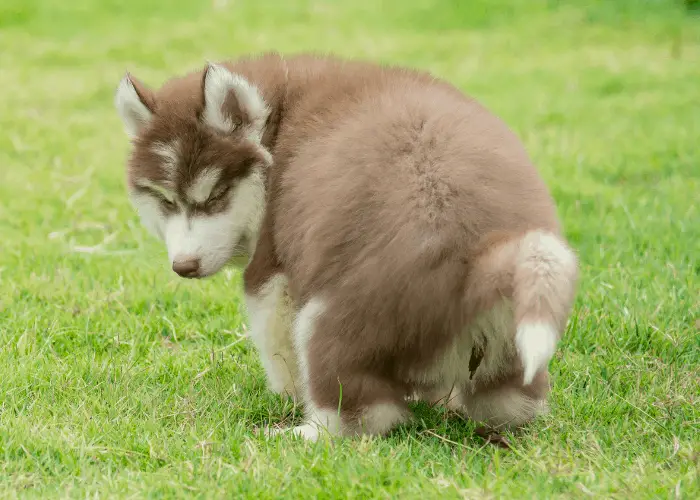
After the puppy has begun to take in some solid foods and the mother stops taking care of it herself, how often will a healthy puppy need to poop on a given day?
Knowing the answer to this question can greatly reduce the guesswork involved in housebreaking a pup. We’re going to run through several milestones that a growing puppy will go through, all of which will change how often it’ll need to relieve itself.
-
Newborn Puppy Poop
When circumstances are good, newborn puppies need little attention from people. The mother takes it upon herself to stimulate the puppy’s digestive system to poop through licking, typically after the puppy eats.
However, sometimes a mother needs help nursing or aiding her pups to relieve themselves. This is when it’s important to get the job done on her behalf for the wellbeing of the puppy.
Generally, a newborn puppy up to 3-4 weeks will need to go as often as two hours apart, as well as being fed just as often.
• 4-Week-Old Puppy
2-hour intervals
This is an important milestone because, at this age, they’ll be able to begin the process of eating solid foods. Plus, they’ll begin to be able to defecate and urinate on their own without stimulation.
However, the frequency at this point won’t have changed from the “every two-hour” routine.
• 6-Week-Old Puppy
At 6 weeks old, most of its nutrition will be coming from puppy food rather than its mother. However, they’ll still take advantage of their mother, as she’ll still be willing to allow them to feed.
Also, by 6 weeks they should be pooping with no help from either their mother or its owner. By 6 weeks, they’ll poop up to five times per day.
• 8-Week-Old Puppy
At 8 weeks, the puppy will slightly have decreased frequency, only needing to poop up to 4 times per day.
FYI: What does an 8-week-old puppy poop look like?
Having been completely weaned from its mother by this age and maintaining a solid diet of only puppy food, the puppy poop should appear as it would an adult dog’s, but likely softer and at a much smaller scale.
As stated above, too loose means that the pup isn’t digesting correctly. Too hard is a sign of being dehydrated.
• 9-Week-Old Puppy
In truth, there is little change between 8 and 9 weeks concerning pooping habits, but if anything, it will begin to decrease all that much more in frequency- perhaps up to four times per day.
• 10 Weeks Old
At this point, 4 times per day would become the new norm for most puppies.
• 12-Week-Old Puppy Poop
At 12 weeks, 4 times per day remains the norm, however, most trainers will recommend that the pup is taken out no longer than every 4 hours at this age. This includes peeing as well as pooping.
• 3-Month-Old Puppy
Not much news here. Even at three months, the “every 4-hour” regimen should be maintained to further incorporate positive potty habit building. They still do poop up to 4 times per day, though larger breeds tend to be able to hold it longer than smaller breeds at this age.
• 4-Month-Old Puppy
A 4-month-old puppy can tack on an extra hour, making it every 5 hours to go out according to trainers. At 4 months, there is a closer correlation between their meals and poop requirements.
At 4 months, however many times they eat throughout the day is how many times they’ll need to poop. Depending on the breed’s dietary requirements, this can be reduced to three times per day- two in some cases.
What is a Normal Puppy Poop?
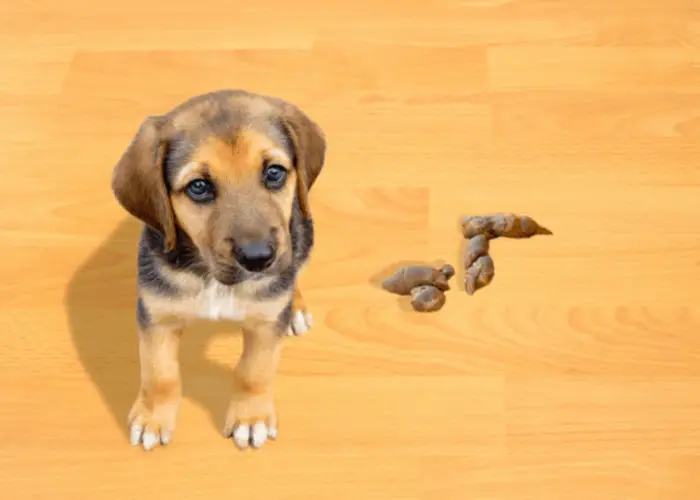
Normal puppy poop should be similar to that of an adult, except for being slightly softer. Too hard could mean that the puppy is dehydrated and too soft would mean that something is going on intestinally, and should be monitored for about 24hrs.
The best way to ensure that you’re doing your part to help your pup in this department is to make sure it doesn’t eat anything it shouldn’t and also ensure that it gets all the water it needs. If abnormalities persist, it’s time to talk to a veterinarian.
How long does it take a puppy to poop after eating?
A general rule of thumb is that you should wait between 5-30 minutes to take your pup out for a potty break (if not a walk), after having a meal. The younger the pup, the closer to the 5-minute mark they’ll be.
When Does Puppy Poop Become Solid?
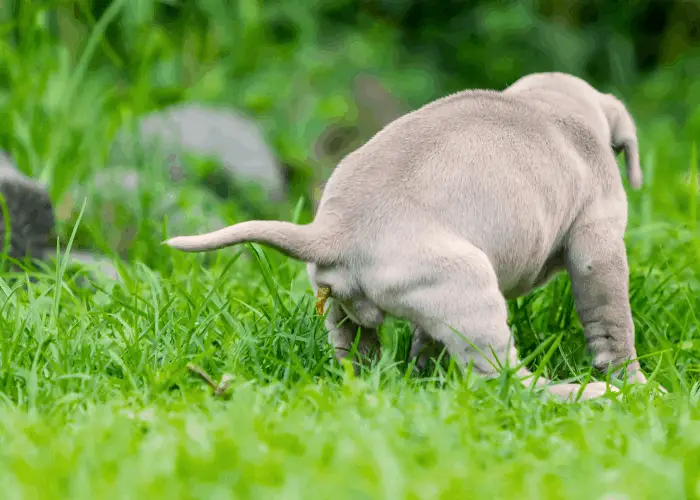
I guess the answer depends on what is meant by the question.
When it comes to digestion, it takes around (mostly under) 10 hours from eating to develop a healthy, regular, solid poop.
If you’re asking the question looking for at what age they go from what the mother takes care of to pooping on their own, it depends. When a puppy is suckling from its mother, the poop is eaten by the mother, as it isn’t “nasty” to the mother yet. It’s different in texture, color, (and I’d assume taste) before the puppy starts eating solid foods.
Once the puppy begins eating purchased puppy foods rather than only mother’s milk, it changes the ingredients of the poop, making it taste bad to the mother, and is more what we would call “poop-like.” Because the mother won’t eat it, you’ll begin finding it.
My puppy poops 8 times a day. Should I be worried?
Perhaps. If it is runny or wet, dehydration can take place eventually due to diarrhea, or be a sign of worse problems. It certainly wouldn’t hurt to call a vet to either make an appointment or gather advice specific to your pup.
Is it normal for a puppy to not poop for a day?
If your puppy skips a day of pooping, it does not necessarily cause concern. However, any more than that- call the vet.
What do you do when your puppy doesn’t poop?
The safest way to handle this is to simply take it to the vet. Not only will the vet utilize things at his disposal to alleviate the problem, but will also be able to help you pin down why it happened in the first place.
Final Thoughts
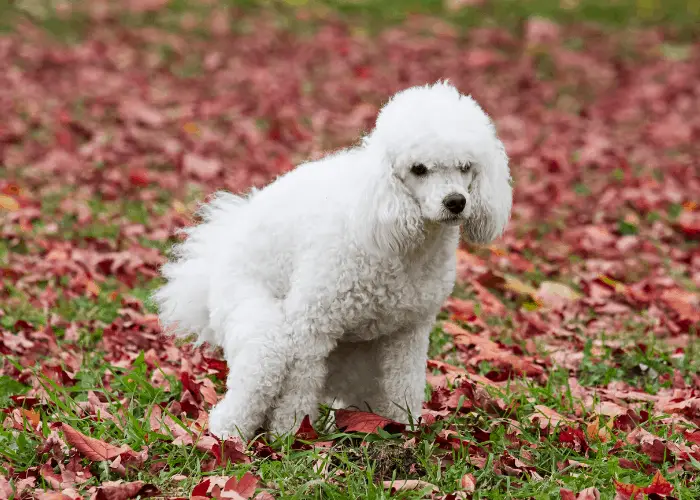
Poop is a dirty topic, but a necessary evil. How closely we pay attention to our pup’s pooping habits, the more likely the pup will become better trained, remain healthy, and be spared prolonged, or even life-threatening issues that may otherwise go unnoticed.

